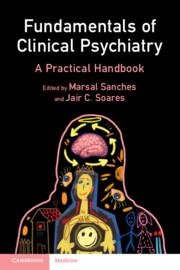Book contents
- Fundamentals of Clinical Psychiatry
- Reviews
- Fundamentals of Clinical Psychiatry
- Copyright page
- Contents
- Contributors
- Foreword
- Preface
- Chapter 1 Introduction
- Chapter 2 The Psychiatric Interview
- Chapter 3 Psychopathology and the Mental Status Examination
- Chapter 4 Classifications and the Diagnostic Process in Psychiatry
- Chapter 5 Neurobiology of Mental Disorders
- Chapter 6 Psychosocial Theories and Their Implications for Psychiatry
- Chapter 7 General Aspects of Psychopharmacology
- Chapter 8 Neurostimulation Treatments
- Chapter 9 Ethico-legal Considerations in Psychiatry
- Chapter 10 Transcultural Aspects of Mental Health Care
- Chapter 11 Child and Adolescent Psychiatry
- Chapter 12 Principles of Geriatric Psychiatry
- Chapter 13 Reproductive Psychiatry
- Chapter 14 Psychomotor Agitation
- Chapter 15 The Suicidal Patient
- Chapter 16 Depressive Disorders
- Chapter 17 Bipolar Disorders
- Chapter 18 Psychotic Disorders
- Chapter 19 Anxiety Disorders
- Chapter 20 Obsessive-Compulsive Disorder
- Chapter 21 Posttraumatic Stress Disorder
- Chapter 22 Borderline Personality Disorder
- Chapter 23 Antisocial Personality Disorder
- Chapter 24 Other Personality Disorders
- Chapter 25 Eating Disorders
- Chapter 26 Alcohol Use Disorder
- Chapter 27 Other Substance Use Disorders
- Chapter 28 Autistic Spectrum Disorders
- Chapter 29 Attention Deficit/Hyperactivity Disorder
- Chapter 30 Delirium and Other Medical Conditions Presenting with Psychiatric Symptoms
- Chapter 31 Dementia
- Chapter 32 Psychiatric Care of the Medical Patient
- Appendix
- Index
- References
Chapter 23 - Antisocial Personality Disorder
Published online by Cambridge University Press: 02 January 2025
- Fundamentals of Clinical Psychiatry
- Reviews
- Fundamentals of Clinical Psychiatry
- Copyright page
- Contents
- Contributors
- Foreword
- Preface
- Chapter 1 Introduction
- Chapter 2 The Psychiatric Interview
- Chapter 3 Psychopathology and the Mental Status Examination
- Chapter 4 Classifications and the Diagnostic Process in Psychiatry
- Chapter 5 Neurobiology of Mental Disorders
- Chapter 6 Psychosocial Theories and Their Implications for Psychiatry
- Chapter 7 General Aspects of Psychopharmacology
- Chapter 8 Neurostimulation Treatments
- Chapter 9 Ethico-legal Considerations in Psychiatry
- Chapter 10 Transcultural Aspects of Mental Health Care
- Chapter 11 Child and Adolescent Psychiatry
- Chapter 12 Principles of Geriatric Psychiatry
- Chapter 13 Reproductive Psychiatry
- Chapter 14 Psychomotor Agitation
- Chapter 15 The Suicidal Patient
- Chapter 16 Depressive Disorders
- Chapter 17 Bipolar Disorders
- Chapter 18 Psychotic Disorders
- Chapter 19 Anxiety Disorders
- Chapter 20 Obsessive-Compulsive Disorder
- Chapter 21 Posttraumatic Stress Disorder
- Chapter 22 Borderline Personality Disorder
- Chapter 23 Antisocial Personality Disorder
- Chapter 24 Other Personality Disorders
- Chapter 25 Eating Disorders
- Chapter 26 Alcohol Use Disorder
- Chapter 27 Other Substance Use Disorders
- Chapter 28 Autistic Spectrum Disorders
- Chapter 29 Attention Deficit/Hyperactivity Disorder
- Chapter 30 Delirium and Other Medical Conditions Presenting with Psychiatric Symptoms
- Chapter 31 Dementia
- Chapter 32 Psychiatric Care of the Medical Patient
- Appendix
- Index
- References
Summary
Antisocial personality disorder (ASPD) is a mental condition in which a person exhibits a pattern of repeated disregard for and violation of others’ rights. The Diagnostic and Statistical Manual of Mental Disorders (DSM) provides the framework for diagnosing ASPD. The prevalence rate of ASPD is high in prisons. Genetics, epigenetics, neuroscience, sociology, epidemiology, psychology, and other behavioral science fields have attempted to find a primary etiology. Despite decades of research, the precise etiology of ASPD has not been found, and its pathophysiology remains a complex question. The interaction between genes and the environment appears to be a significant factor in the development of ASPD. Brain imaging in subjects with ASPD has revealed structural brain changes in those with ASPD. Individuals with ASPD are challenging to manage for health care providers because of their complicated clinical presentation, high comorbidity of medical and mental disorders, lack of licensed pharmacotherapies for ASPD, and increased utilization of healthcare resources. ASPD requires tremendous effort from treating clinicians. Clinicians can successfully manage individuals with ASPD if they remain aware of the unique challenges of these patients while thoughtfully applying available research.
- Type
- Chapter
- Information
- Fundamentals of Clinical PsychiatryA Practical Handbook, pp. 232 - 238Publisher: Cambridge University PressPrint publication year: 2025

